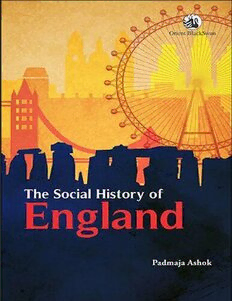
The Social History of England PDF
Preview The Social History of England
The Social History of England For our entire range of books please use search strings “Orient BlackSwan”, “Universities Press India” and “Permanent Black” in store. The Social History of England Padmaja Ashok THE SOCIAL HISTORY OF ENGLAND ORIENT BLACKSWAN PRIVATE LIMITED Registered Office 3–6-752 Himayatnagar, Hyderabad 500 029, Telangana, India e-mail: [email protected] Other Offices Bengaluru, Bhopal, Chennai, Guwahati, Hyderabad, Jaipur, Kolkata, Lucknow, Mumbai, New Delhi, Noida, Patna, Visakhapatnam © Orient Blackswan Private Limited 2011 First published 2011 Reprinted 2012 (four times), 2013, 2014, 2015 (three times), 2016 (two times), 2017, 2018 Second edition 2018 eISBN 9789352876297 e-edition: First Published 2019 e-Pub Conversion: Textsoft Solutions Pvt. Ltd. All rights reserved. No part of this publication may be reproduced, distributed, or transmitted in any form or by any means, including photocopying, recording, or other electronic or mechanical methods, without the prior written permission of the publisher, except in the case of brief quotations embodied in critical reviews and certain other noncommercial uses permitted by copyright law. For permission requests write to the publisher. Contents Cover Title Page Lists of Maps and Genealogical Charts Foreword Preface 1 The Early History of England 1 The Early History of England 2 Tudor England (1485 to 1603) 3 The Renaissance 4 The Reformation and the Counter Reformation 5 The Stuart Age (1603 to 1649, 1660 to 1714) 6 Puritanism 7 Colonial Expansion 8 Restoration England (1660 to 1688): Social Life 9 The Age of Queen Anne (1702 to 1714) 10 Hanoverian England 11 The Industrial Revolution 12 The Agrarian Revolution 13 The Rise of Methodism 14 Humanitarian Movements 15 The American War of Independence (1775 to 1783) 16 The Effects of the French Revolution on British Life 17 England at the Beginning of the Nineteenth Century (1800 to 1837) 18 The Victorian Age (1837 to 1901) 19 The Reform Bills 20 The Development of Transport and Communication 21 The Development of Education in the Nineteenth Century 22 The Dawn of the Twentieth Century 23 Life Between the Two World Wars (1919 to 1939) 24 The Effects of World War II 25 Social Security and the Welfare State 26 The Effects of the Cold War 27 Life in the Sixties 28 Life in the Seventies 29 Life in the Eighties 30 Trade Unionism 31 The Origin and Growth of Political Parties in England 32 Life in the Nineties 33 England in the Twenty-first Century Appendix I: The Rulers of England Appendix II: The Prime Ministers of England Appendix III: Glossary List of Maps 1 The United Kingdom and its Neighbours 2 Voyages of the Renaissance Explorers 3 Colonies of the British Empire 4 Literary Map of Great Britain and Ireland List of Genealogical Charts 1 The Norman Kings and the Plantagenet Family 2 Edward III’s Claim to the French Throne 3 The Houses of Lancaster and York 4 The Tudors 5 The House of Stuart 6 The Claim of the House of Hanover to the British Throne 7 The Houses of Hanover and Windsor Foreword Among the various countries of the world which have a hoary past and a rich culture to feel proud of, Great Britain stands supreme. The language of Great Britain is now the language of the world. English is the language of commerce, industry and science. More than all, it is perhaps most profound in its literature, right from the time of King Alfred to our day. We have sound literary histories which offer us chronological accounts of literary creations spanning such a large period as thirteen centuries. The social history of any nation is an independent discipline most useful for promoting literary scholarship. It supplies us with a knowledge of the past and a glimpse into the future. Literature and society are linked to each other in ever so many ways. A knowledge of the one enhances an understanding of the other. Literature is a social establishment. The social history of England is dazzlingly rich and variegated, full of rewards for an avid student of English literature. Times have changed. English studies do not mean the study of the narrow confines of British territory only anymore. Horizons have broadened with the proliferation of newer and yet newer areas of study seeking inclusion in this widening spectrum of literary knowledge. A sound knowledge of the social and intellectual background of English history is of utmost necessity, as it is meant to supply the most essential foundations. With greater focus on what has come to occupy central attention in critical studies, New Historicism, history and literature seem to be inextricably bound to each other. Nay, the two are one and the same. There are not many scholarly resources available to our Indian students at the advanced beginner level. It is here that the present volume The Social History of England fills the gap and fulfils the want. The book covers the period 500 BCE to 2018. It is the outcome of Dr Padmaja Ashok’s long
